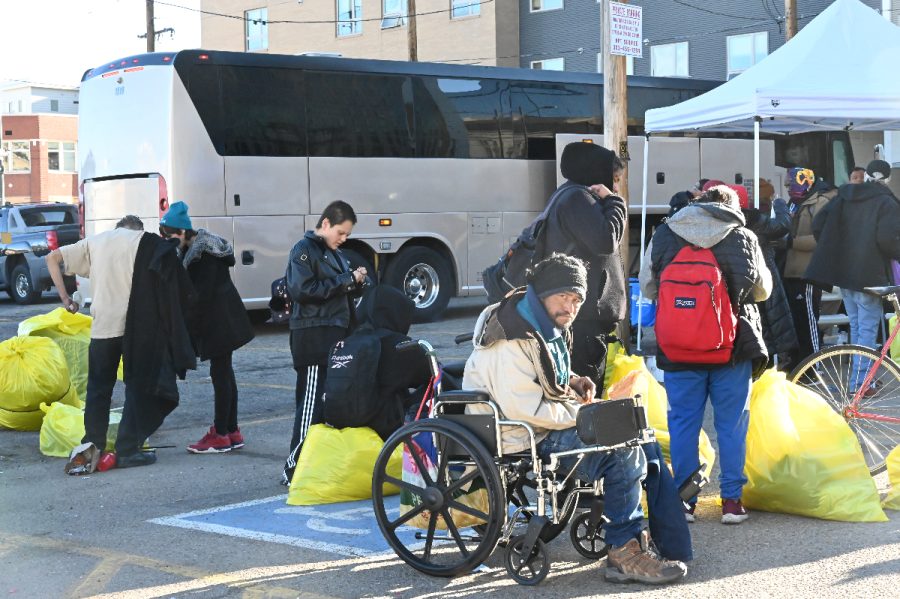
Bennito L. Kelty

Audio By Carbonatix
The City of Denver announced that the St. Francis Center, Urban Alchemy and Bayaud Works have been selected to take over operations at three homeless shelters previously run by the Salvation Army.
The Denver Department of Housing Stability (HOST) picked the three organizations “through a competitive request for proposal process,” according to an October 9 announcement, but Denver City Council still needs to approve the selection before they can step in by January 1, like HOST wants. Housing stability officials will present these providers to the council’s Community Planning and Housing Committee on Tuesday, October 14.
In 2023 and 2024, Denver Mayor Mike Johnston opened nearly a dozen hotel shelters and micro-communities for homeless residents to stay in while they secured permanent housing. The new housing opened as part of his All In Mile High (AIMH) initiative to fight homelessness in his first term, which is halfway over (and he claims homelessness is halfway solved). Heading into 2026, the city will operate eight AIMH sites as it tries to balance a $200 million budget deficit.
The Salvation Army ran three AIMH shelters, all of which were converted from hotels, for two years before announcing in August that it would exit at the end of 2025 to ensure “financial stability,” the organization said at the time. The Salvation Army also faced criticism for safety concerns at the sites it operated, in particular the former Doubletree at 4040 Quebec Street, now called the Aspen.
Urban Alchemy, based in California, runs homeless shelters across the country, including in San Francisco, Los Angeles, Birmingham, Santa Fe, Atlanta and Portland, according to the City of Denver. The nonprofit is slated to manage the city-funded hotel shelter named the Aspen; according to the city, Urban Alchemy is new to operating in Denver.
The Aspen is one of the most controversial sites. It’s the largest city-funded hotel shelter, with nearly 300 rooms and an acquisition cost of $43 million. The shelter was also the site of a still-unsolved double homicide in March 2024. In March of this year, an employee at the Aspen was arrested for sexually assaulting a resident. The Salvation Army hired the employee, but didn’t catch that he had been arrested for multiple bank robberies because of Colorado laws limiting background checks to ten years, the organization claimed.
Urban Alchemy comes to Denver with its own experiences. In late September, an employee for an Urban Alchemy site in San Francisco was shot and killed, prompting a demonstration from hundreds in the community to honor him on Wednesday, October 8. That same month, the City of San Francisco accused the nonprofit of overspending money from a $22.7 million homeless shelter contract by giving pay bumps to its employees, potentially jeopardizing an Urban Alchemy contract in the city
Around the same time its Bay Area trouble surfaced, the City of Austin, Texas, decided to end its contracts with Urban Alchemy, which was running one of its downtown emergency shelters. The nonprofit “misrepresented” data concerning when people were exiting shelters, according to the City of Austin.
In a statement included in HOST’s Thursday press release, Urban Alchemy CEO Lena Miller says the organization tries to “provide a Four Seasons-like experience” at homeless shelters.
“We take responsibility for the conditions both inside and outside of our shelters that we manage and operate to give our guests a sense of belonging, pride and safety,” Miller adds. “We look forward to contributing to the progress of Denver’s ‘All in Mile High’ initiative, and helping our guests get connected to services, career pathways, and permanent housing.”
Meanwhile, HOST wants Bayaud Works to run the Tamarac Family Shelter, a former Embassy Suites at 7525 East Hampden Avenue. The city has worked with Bayaud in the past, and Bayaud is already managing the Stay Inn micro-community at 12033 East 38th Avenue, a 54-unit site in front of a motel. The city bought the Stay Inn motel in late 2022, but the rooms have remained empty ever since, with the city only using the parking lot so far. Denver-based company AC Disaster Consulting bought Bayaud in July, while it was already working with Denver, and transitioned Bayaud from nonprofit status into a for-profit subsidiary.
The St. Francis Center, a faith-based nonprofit in Denver, was chosed to run Stone Creek, a 182-unit at 4595 Quebec Street that was formerly a Best Western. St. Francis Center was operating an All In Mile Site at a former Comfort Inn at 4685 Quebec Street with 136 beds. The mayor revealed in September that the Comfort Inn shelter will close by March 2026.
“We believe in an individualized, evidence-based approach to ending homelessness,” Nancy Burke, CEO of St. Francis Center, says in a statement. “The data is clear: Combining access to safety and stability with adaptive, wraparound services works. We’re proud to partner with HOST and support Mayor Johnson’s priorities to expand access to housing, jobs and treatment.”
HOST promised “no expected interruptions in service during the transition,” which is expected to happen around the end of the year pending council approval.